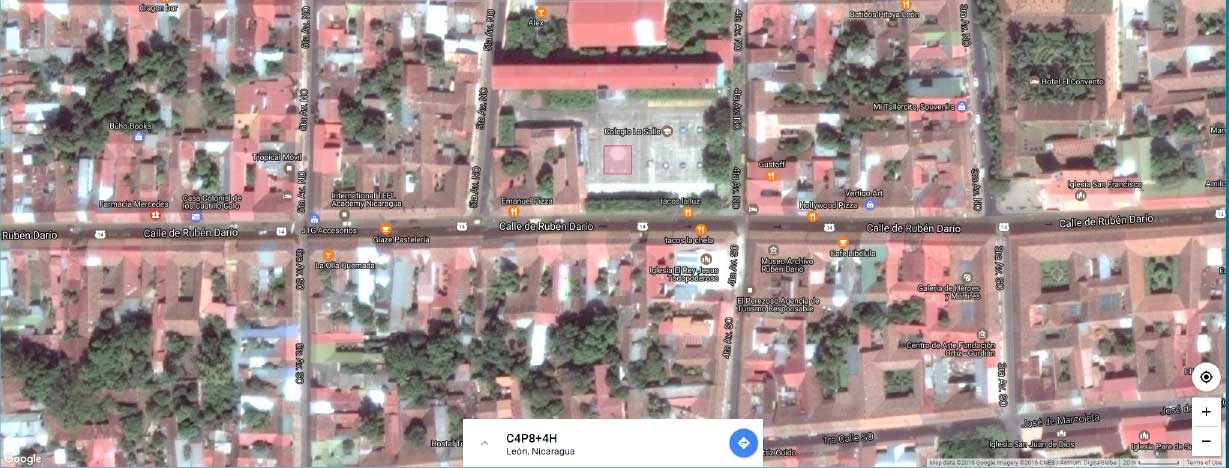Living here in Nicaragua I’ve been exposed to a strange situation.
I can give my address in 3 different ways from landmarks or simply say who used to live here as it was a large mechanic for decades. Confusing if you aren’t from here. The locals however seem to get by just fine. In order to give directions from a landmark I have to use the cardinal directions of North, Up, South, Down (East and West are replaced with Sun Up and Sun Down here). I can also use meters or varas. Varas, I was surprised to find out are used in land titles in Texas and other areas colonized by the Spanish.
I realize large portions of the world have no formal addressing system. Here they do, but I’ve been told the revolutions deemed it a colonial/american plan to control them so they forced everyone to abandon it. Literally at gunpoint I hear. The old people know how the old system works. My address would be something like 6224 Avenida 6 Sur Oeste, but that doesn’t work for anything here. The street names are there on the corners as are many of the house numbers, but they can’t or won’t use them. The streets were all renamed to revolutionaries that died “in these streets” but they didn’t put street signs up.
They current system works but I think in the long run is unworkable. Technology will eventually have an influence I believe. For instance, when more people start using Google Maps or similar, they’ll see the old Colonial street names. But maybe there is a third. A way that helps areas such as Nicaragua who wish to (or are forced to) eschew their previous overlords system while at the same time introducing a system to areas that have never had one (or have a system similar to Nicaragua’s but got to it another way).
I was recently turned on to https://plus.codes/ which converts areas into codes. A city has a few digits and then a house has a few. Really they are taking long/lat and converting into a human usable string. One could use the whole string or use the house code alongside the city name.
The benefits are:
- A global system that is human and machine readable.
- Allows anyone anywhere to know their address and receive deliveries or visitors. This is especially useful in areas that have no formal system or which are, like Nicaragua, confusing for outsiders who are not used to relative addresses and who do not know the landmarks anyways.
- Transferable to other planets, so very forward thinking!
- It is simpler than giving an entire address, street, city, state, country, zip. Even when just giving an address and name to a local driver it is simpler and clearer to both say and input C4P8+4H. For sharing addresses say with Amazon it seems simple to use the entire code, 764MC4P8+4H.
- Google Maps already uses it. As does the main website of Plus Codes. The downside is they are the only ones AFAIKT. I checked with a few others and nothing (Bing, MapQuest, Here, Open).
Unlike the Nicaraguan revolutionaries who want to impose their own system, this one is voluntary. For groups who want to eschew the previous system as being of their oppressors, this is a viable option. I fall into this group. It isn’t high on my list. The benefit to anarchists is that it allows all of the above, but it goes a step further to eliminate the need for city or state names which amount to government dictated areas. In fact, at the street level it seems unnecessary, though simpler. At the country or province level it seems useful. I do not foresee a future when anyone eschews their city as a convenient place name or even prideful demonym. In fact, I don’t even think the system can be used to describe general areas. For instance, if this is a full address 764MC4P8+4H, I can see that truncating form the right seems to leave me with an unusable string. However, I can also see that any area next to 764MC4P8+4H will have many characters in common, starting with the ones on the left and changing on the right as I click to nearby areas. It seems that it is a usable string but that the website isn’t designed to interpret general areas. Ultimately, I may want to eschew the government areas delineated by imaginary lines called borders but I don’t see myself ever saying I’m from 764M. A bit cold for my likes.
